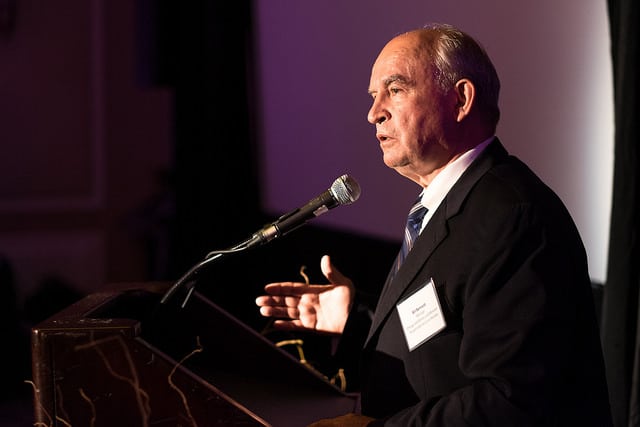Promises of a closer relationship between B.C. and Alaska and more consultation on B.C. mine applications are a good start, but, so far, Southeast Alaska has no more guarantees that those mines will not pollute salmon-bearing rivers than before this week’s visit by B.C.’s Energy and Mines Minister Bill Bennett, say Alaskan fishing and conservation groups.
Bennett, accompanied by senior civil servants from the ministries of Energy and Mines and Environment, took a conciliatory tone as he met with state officials, policy-makers and critics of what is seen as an aggressive push by B.C. to develop mines in the transboundary area, close to vitally important salmon rivers such as the Unuk, Taku and Stikine.
“I understand why people feel so strongly about protecting what they have,” Bennett said in a Juneau news conference with Alaska Lt. Governor Byron Mallott.
“There’s a way of life here that has tremendous value and the people here don’t want to lose it. I get that,” he said.
But promises of a strengthened dialogue and more opportunities to comment on mine applications fall far short of a growing chorus of Alaskan demands that the issue be referred to the International Joint Commission, formed under the Boundary Waters Treaty, which forbids either country from polluting transboundary waters.
It was a step forward to have such a high-level meeting, said Chris Zimmer of Rivers Without Borders, but it is an international issue that demands international attention.
“Increased involvement in the B.C permitting process is not a bad thing, but it is not a solution on its own. In other words, we stand firm for the need of an international solution under the Boundary Waters Treaty,” Zimmer said.
Both sides agreed the status quo cannot continue, but the question is how to move forward, Zimmer said.
“How do we move from words to real, concrete action to protect Alaska’s interests?”
Bennett did not rule out the possibility of going to the International Joint Commission, but felt it was premature and the commission should be brought in only if the province and state could not work it out between themselves, said Heather Hardcastle of Salmon Beyond Borders, a coalition of fishing, tribal, tourism and community organizations.
There was also no agreement on the question of how Alaskans would be compensated if there was an upstream spill.
“We are saying we are taking on the lion’s share of the risk and we are not receiving the benefits and there is nothing in place right now, Minister Bennett told us, to deal with liability,” Hardcastle said at a news conference following a meeting with Bennett.
“That’s just unacceptable to us that there’s nothing to compensate us for the lack of our livelihood.”
Financial assurances that Alaskans would be compensated if B.C. mining damages fisheries and water quality are needed prior to projects receiving permits, Hardcastle said.
Dale Kelley, Alaska Trollers Association executive director, said the universal theme was how to ensure no harm befalls Alaska’s fisheries.
“It was quite disturbing to hear the minister say there really is no remedy,” she said.
Both federal governments need to be involved in compensation discussions as a spill would mean a disaster on a scale that could not be handled by the state and provincial governments, Kelley said.
During the visit, Bennett agreed that B.C. should fix leakage from the Tulsequah Chief Mine, that, through a tributary, flows into the Taku River.
Decades of failed promises to fix the leakage have been a thorn in the side of many Alaskans, even though it is not known whether the mine drainage is hurting fish.
After touring the Taku River by helicopter Monday, Bennett told reporters it should be fixed.
“I think B.C is going to have to find a way to rectify it sooner than later and I think it is a most legitimate criticism of us by those folks in Alaska who don’t like it,” he said.
The Tulsequah Chief, now owned by Chieftain Metals Corp, was closed by Cominco in 1957 without acid mine drainage cleanup or site reclamation and despite numerous B.C orders, subsequent owners failed to clean up the mess. The mine was bought by Chieftain in 2010 when the company accepted the environmental liabilities and installed an interim water treatment plant.
“It’s clearly a black eye for Canada,” Zimmer said.
Solutions now, if Chieftain does not reopen the mine and get a grip on the drainage problems, are for B.C. to close down the mine properly — something likely to cost multi-millions of dollars — or to spend $4-million a year to treat the waste in perpetuity, Zimmer said.
“We are looking for very specific action to back these words up.”
Photo: Minister of Energy and Mines Bill Bennett. Credit: Province of British Columbia.
Subscribe to our newsletter
Stay up to date with DeSmog news and alerts







